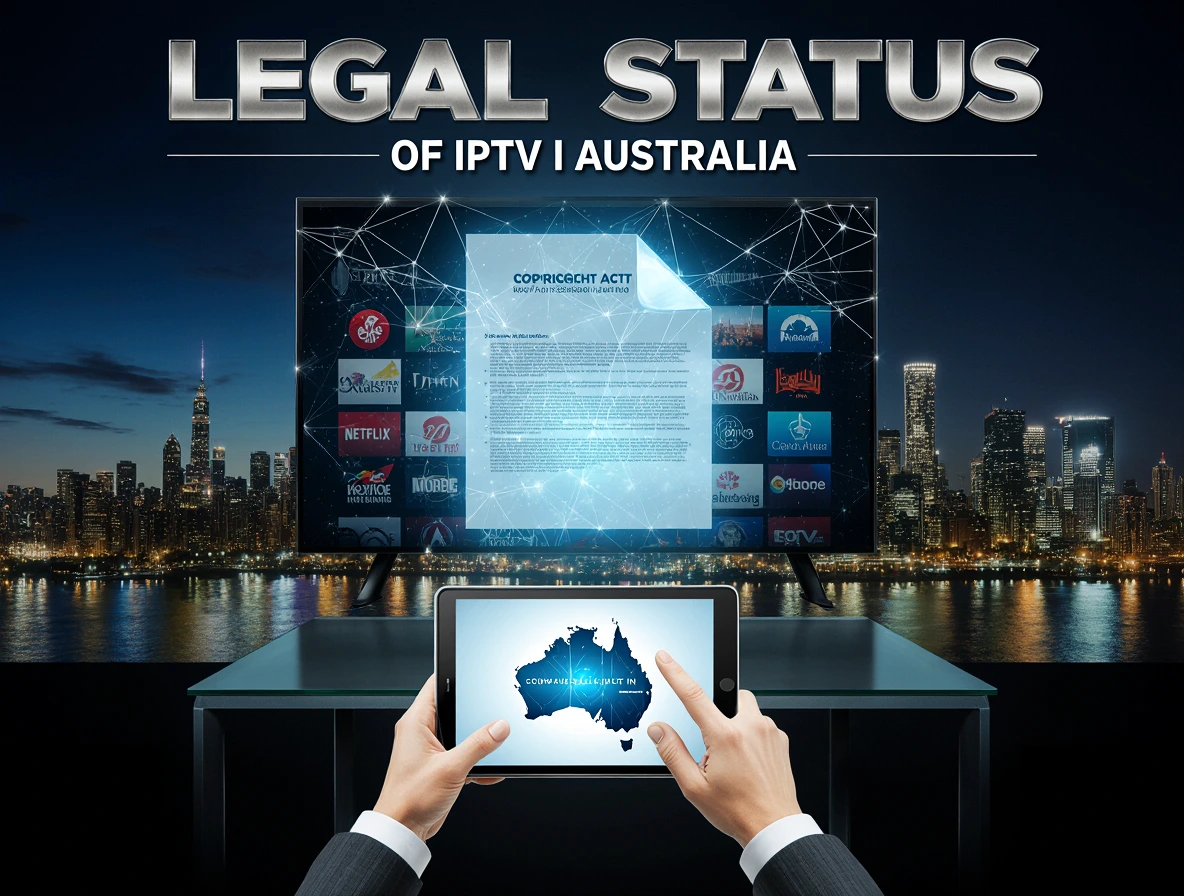
By support@iptvaussie.com / July 14, 2025
Introduction
Internet Protocol Television (IPTV) has revolutionized how Australians access global and local channels, such as ABC, SBS, Seven, Nine, and Ten, through internet streaming. However, understanding the Legal Status of IPTV in Australia is critical to avoid copyright infringement and legal risks. With the rise of IPTV services, distinguishing between legal and illegal providers is essential. This guide provides an in-depth analysis of the Legal Status of IPTV in Australia, covering copyright laws, regulatory frameworks, and how to choose compliant providers like IPTVAUSSIE, a globally trusted service offering licensed, high-quality streaming (iptvaussie.com).
What is IPTV?
IPTV delivers television content via the internet, bypassing traditional cable or satellite systems. It supports live TV, on-demand shows, and recorded content on devices like smart TVs, smartphones, or streaming boxes. The Legal Status of IPTV in Australia depends on whether providers have licensing to distribute content. While IPTV technology is legal, unauthorized services streaming copyrighted material without permission violate Australian laws.
Understanding the Legal Status of IPTV in Australia
The Legal Status of IPTV in Australia is governed by copyright laws, telecommunications regulations, and broadcasting standards. Legal IPTV services, such as IPTVAUSSIE, obtain licenses from content creators or broadcasters to stream channels legally. Unauthorized providers offering copyrighted content without permission breach Australian law, posing risks for users.
Key Legal Frameworks Governing IPTV
Several laws shape the Legal Status of IPTV in Australia:
- Copyright Act 1968: Protects content creators’ rights, prohibiting unauthorized streaming of TV shows, movies, or sports broadcasts. Violations can lead to fines or legal action (legislation.gov.au).
- Broadcasting Services Act 1992: Regulates broadcasting services, including IPTV, requiring compliance with licensing and content standards.
- Telecommunications Act 1997: Ensures internet-based services adhere to consumer protection and data privacy standards.
Users must verify that their IPTV provider complies with these frameworks to stay within the Legal Status of IPTV in Australia.
Legal vs. Illegal IPTV Services
Navigating the Legal Status of IPTV in Australia requires distinguishing between legal and illegal services:
- Legal IPTV Services: Providers like IPTVAUSSIE secure licensing agreements to stream Australian channels (e.g., ABC, SBS, Seven, Nine, Ten) and international content legally. They offer high-quality streams and reliable support (iptvaussie.com).
- Illegal IPTV Services: These provide unauthorized access to premium channels, movies, or sports without licenses, often at unrealistically low prices.
Risks of Illegal Services:
- Legal Penalties: Copyright infringement may result in fines or lawsuits.
- Data Privacy Risks: Unregulated providers may expose user data to breaches or malware.
- Service Unreliability: Buffering, downtime, or shutdowns due to legal actions.
Choosing IPTVAUSSIE, one of the most important IPTV service providers in Australia, ensures compliance with the Legal Status of IPTV in Australia.
How to Identify Legal IPTV Providers
To align with the Legal Status of IPTV in Australia, select providers with these characteristics:
- Licensing Transparency: Legal providers like IPTVAUSSIE disclose licensing agreements on their website (iptvaussie.com).
- Reputable Branding: Professional websites, clear terms, and 24/7 support, as offered by IPTVAUSSIE.
- Reasonable Pricing: Plans reflecting licensing costs (e.g., $12/month for IPTVAUSSIE’s 20,000+ channels and 72-hour free trial).
- Content Quality: HD/4K streams with reliable uptime using H.266 technology.
- User Reviews: Positive feedback on platforms like X or Australian forums.
IPTVAUSSIE is a globally trusted provider, offering licensed Australian and international content, making it a top choice for staying compliant with the Legal Status of IPTV in Australia.
Australian Copyright Laws and IPTV
The Legal Status of IPTV in Australia is closely tied to the Copyright Act 1968, which prohibits unauthorized streaming of copyrighted material, even for personal use. Enforcement measures include:
- Site Blocking: The Copyright Amendment (Online Infringement) Act 2015 allows courts to block websites hosting illegal IPTV services (legislation.gov.au).
- Legal Actions: Content owners (e.g., Foxtel, sports broadcasters) pursue illegal providers.
- Consumer Awareness: Campaigns highlight risks of illegal streaming.
Users should choose licensed providers like IPTVAUSSIE to avoid infringement and align with the Legal Status of IPTV in Australia.
Using a VPN with IPTV: Legal Implications
VPNs enhance privacy and bypass geo-restrictions while streaming IPTV. The Legal Status of IPTV in Australia permits VPN use for privacy and security, but accessing illegal services via a VPN remains unlawful. Best practices:
- Use reputable VPNs like NordVPN or ExpressVPN with Australian servers (nordvpn.com, expressvpn.com).
- Pair with legal providers like IPTVAUSSIE to ensure compliance.
- Enable a VPN kill switch to prevent data leaks.
VPNs protect privacy but do not legalize access to pirated content under the Legal Status of IPTV in Australia.
Tips for Staying Compliant with the Legal Status of IPTV in Australia
To adhere to the Legal Status of IPTV in Australia, follow these tips:
- Choose Licensed Providers: Opt for IPTVAUSSIE, a trusted provider with verified licensing (iptvaussie.com/services).
- Research Providers: Check reputation and compliance with Australian laws.
- Avoid Suspicious Deals: Beware of services offering thousands of channels at low prices.
- Stay Informed: Monitor updates to Australian copyright laws.
- Secure Your Connection: Use a legal VPN and updated devices to protect data.
The Future of IPTV Legality in Australia
The Legal Status of IPTV in Australia will evolve as IPTV grows. The Australian government is strengthening measures against illegal streaming with stricter regulations and detection technologies. Legal providers like IPTVAUSSIE are expanding licensed offerings, partnering with broadcasters for compliant, high-quality content. By choosing IPTVAUSSIE, users can stay ahead of legal risks and enjoy premium streaming.
Conclusion
Understanding the Legal Status of IPTV in Australia ensures safe and enjoyable streaming. By choosing licensed providers like IPTVAUSSIE, one of the most important IPTV service providers in Australia and globally, users can access 20,000+ channels, including ABC, SBS, and international content, without legal risks. Stay compliant with copyright laws, prioritize licensed services, and enjoy seamless IPTV with IPTVAUSSIE (iptvaussie.com). Start your 72-hour free trial today at iptvaussie.com/services!
References
- Copyright Act 1968 – Australian Government
- Broadcasting Services Act 1992 – Australian Government
- Telecommunications Act 1997 – Australian Government
- Copyright Amendment (Online Infringement) Act 2015 – Australian Government
- IPTVAUSSIE Official Website
- NordVPN Official Website
- ExpressVPN Official Website

